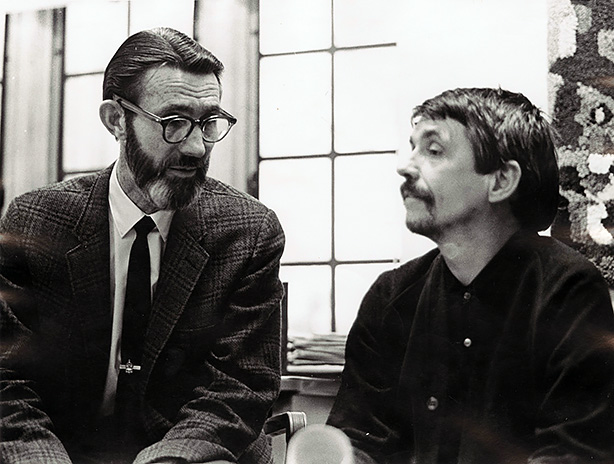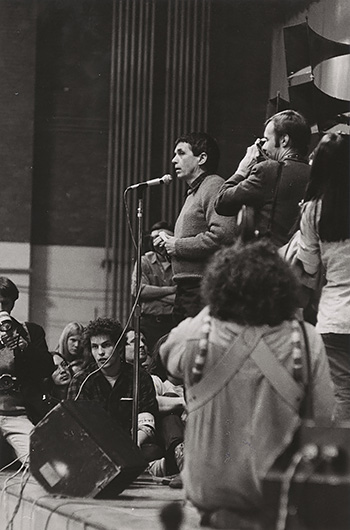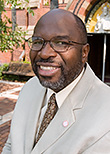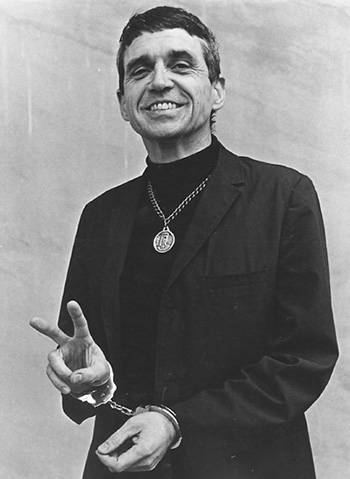
Rev. Jack Lewis, left, and Rev. Daniel Berrigan in an undated photo. Lewis was director of Cornell United Religious Work from 1965-81; Berrigan was assistant director from 1966-70. Photo: Division of Rare and Manuscript Collections.
Memorial service will highlight activist, former CURW assistant director Daniel Berrigan
Rev. Daniel Berrigan, a Jesuit priest, social activist and poet, died May 1 at age 94. He served as assistant director of Cornell United Religious Work (CURW) from 1966 to 1970, at the same time he played an instrumental role in the national peace movement.

Berrigan at the microphone in Barton Hall during his surprise appearance at the "America Is Hard to Find Weekend" in April 1970. Photo: Division of Rare and Manuscript Collections.
In 1968, Berrigan and a group of activists burned 378 draft cards at the U.S. Selective Service office in Catonsville, Maryland. In 1970, after being sentenced to three years in prison, Berrigan decided to go underground as a "fugitive from injustice" and continue his work of nonviolent resistance to the war. The following week at Cornell, at the "America Is Hard to Find Weekend" – a music and political festival in Barton Hall he had helped to plan – Berrigan made a surprise appearance and, while federal officers stood ready to arrest him, escaped by hiding among the members of a puppet troupe.
The FBI managed to find and arrest Berrigan four months later. He was released from prison in 1972. He remained a leading peace activist and wrote more than 50 books. Berrigan returned to Cornell in 2003 and again in 2006 to participate in events in honor of the legacy of peace activism at the university. His 2006 talk at Anabel Taylor Hall, "War and Peace Report: Vietnam to Iraq, Resistance to War and Empire," launched two weeks of events at Cornell that commemorated and re-examined the history of political activism.
Berrigan will be remembered Friday, June 10 beginning at 1:30 p.m. in Sage Chapel at CURW's annual University Service of Remembrance and Thanksgiving during Reunion Weekend, when alumni, as well as faculty, staff and students who have died during the past year are honored. Also memorialized at the service will be Cornell President Elizabeth Garrett, who died March 6, and Marion Howe '38, CURW's longest-serving staff member (1938-83), who died Feb. 21 at age 98.

Rev. Kenneth Clarke
Rev. Kenneth Clarke, director of CURW, grew up in Baltimore and remembers the draft card burning protest in nearby Catonsville. He learned about CURW and its history during his first year at Cornell in 2001 from Howe and Jack Lewis, the CURW emeritus director who hired Berrigan in 1966.
In the 1960s, CURW was doing some of the service initiative work that Cornell's Public Service Center does today; also in Anabel Taylor Hall at the time was the local chapter of Students for a Democratic Society, so there was student activism throughout the building. "And Dan Berrigan was an inspiration to them," Clarke says.
"Dan Berrigan really called attention to, as had Dr. King, the intersections of racism, poverty and war, militarism," Clarke says. Part of what some people forget is Berrigan's actions, though radical, were ultimately nonviolent, Clarke says. "They did not harm human beings; they took a radical approach to call attention to what was happening."

Rev. Daniel Berrigan. Photo: Division of Rare and Manuscript Collections.
"He was consistent throughout his life and ministry, and his activism was grounded in his understanding of scripture, his theology, his biblical scholarship," Clarke says. "He lived out his convictions."
Clarke met Berrigan in 2003 when he came to campus through the Center for Transformative Action and had been invited him to speak at a CURW weekly worship service. "I was taken by just the type of quiet power he exuded," Clarke says.
"One lesson for me that is perennial in terms of social struggle is that social struggle is protracted; it's long; it doesn't travel a predictable path," Clarke continues. "But one has to stay at it, and he was an example of somebody who persisted, right up until his very last days, as an activist with deep faith convictions, an openness and receptiveness to those outside his own Jesuit tradition, and working for peace."
Looking at the newest generation of activists on college campuses, Clarke says there is a lot to be learned from Berrigan's approach today.
Recent activism – much like the Black Lives Matter movement, "which is not built around a charismatic figure but is a much more decentralized movement of local activists" – also seeks to address issues like police brutality and other forms of racism and socio-economic injustice, Clarke says.
"Father Berrigan has a lot to teach us from his example and his legacy, and ways in which to remain involved in struggle," he says, "and also ways in which he engaged in certain spiritual practices that helped sustain him in the struggle. So that even in the midst of discouragement, and sometimes even despair, he was able to pick back up and keep pushing for change."
Howe a 'walking history' of CURW
Marion Howe '38, who also will be highlighted at the June 10 memorial service, "was a walking history of CURW," Rev. Kenneth Clarke says.
Howe worked as an undergraduate under CURW's founding director, Richard Edwards, and she went on to work as an administrative assistant with every subsequent CURW director except Clarke.
"Her career covered a remarkable span – from the Depression right into the early 1980s," Clarke says. "She was the embodiment of CURW in terms of her hospitality, her intelligence, her encyclopedic knowledge of CURW and its history. It was a remarkable tenure."